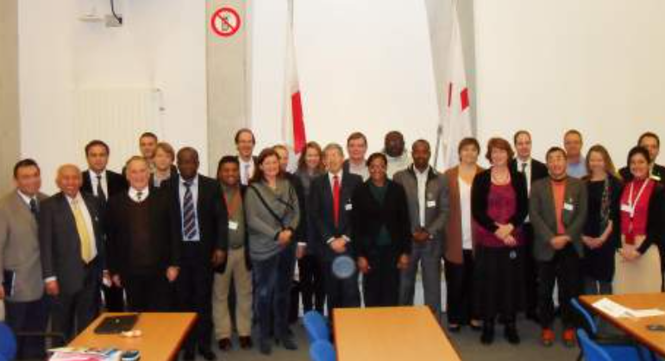
Experts in disaster law and practice from around the world convened in Geneva over two days in early December to review two new complementary tools to the IDRL Guidelines.
These two tools – the Model Act for the facilitation and regulation of international disaster assistance, and the draft Model emergency Decree on the same topic– were initiated in response to requests from governments wanting to know how practically to go about implementing the IDRL Guidelines in their domestic legislation. The Model Act is meant to promote the preferred approach – that states prepare their legal frameworks and procedures on international assistance in advance of a disaster. The draft Model Emergency Decree is designed for states confronted by a disaster before they have been able to adopt more permanent legislation.
As Elise Baudot, IFRC Legal Counsel, noted in her opening remarks, “The Model Act and Model Decree, are intended as practical tools for governments. They must be sound in substance, relevant to the practice of disaster response, and accessible for lawmakers – and it is through wide consultation and expert review in meetings like this that we can ensure they are.”
The Model Act, in its current pilot version, was made available to states and national societies at the 31st International Conference of the Red Cross and Red Crescent in November 2011, and has already served as a resource for several states reviewing or updating their legislation on incoming disaster assistance. Capt. Kayitana Jean Damascene of the Rwandan Ministry of Disaster Management and Refugee Affairs shared with the group Rwanda’s recent experience drafting a new disaster management law, which will include a substantial section on managing international assistance. He remarked that the Model Act had been helpful as a resource for the drafting process, both for the ideas it provides on how to address gaps and also for its commentary’s references to other existing laws. He added his hope that the model could be much better known. Rwanda’s new disaster management law is currently pending adoption by its parliament.
The group focused on the complementary nature of the tools, and recommended that they be rolled out as a package. Considering the different contexts to which the tools are addressed, and the adaptability of the model provisions, they also recommended that the introductory materials be expanded – including to better promote the very clear benefits for disaster-affected states in ensuring an effective framework to both regulate and facilitate incoming international assistance.
Meeting participants included representatives from governments, National Societies, international organisations, legal experts and academia from more than 20 countries around the world. The meeting was hosted by the IFRC in cooperation with project partners OCHA and the Inter-Parliamentary Union (the IPU is partnered only for the Model Act, as a decree is by nature not a parliamentary document).
Click here for more information on the Model Act for the Facilitation and Regulation of International Disaster Assistance.